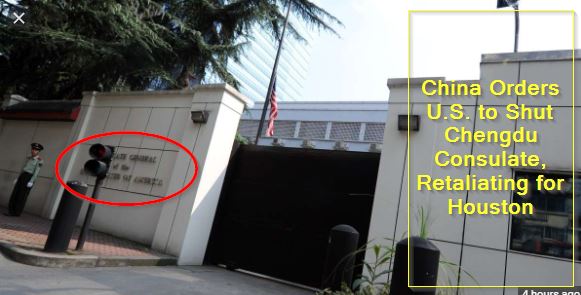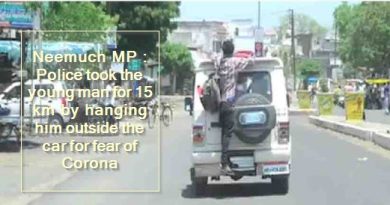China Orders U.S. to Shut Chengdu Consulate, Retaliating for Houston
Foreign Ministry: decision is ‘legitimate and necessary response to the unreasonable behavior of the U.S.’
China orders US to close consulate in Chengdu in retaliation for Houston outpost closure
China ordered the U.S. on Friday to close its consulate in Chengdu, a move U.S. officials anticipated after the Trump administration told Beijing to shutter its consulate in Houston amid accusations of espionage and intellectual property theft.
The dueling diplomatic face-slap amps up already fraught U.S.-China relations as experts warn the world’s two superpowers are lurching toward a new Cold War that could unravel normalized ties that took decades to achieve.
China’s foreign ministry in Beijing did not give Washington a deadline to shut down the diplomatic compound. The U.S. ordered China to close its Houston facility within 72 hours. The foreign ministry urged the U.S. to “immediately retract its wrong decision and create necessary conditions for bringing the bilateral relationship back on track” – a sign that the latest twist in an escalating U.S.-China rift that encompasses everything from technology to human rights has the potential to be temporary.
[amazon box=”B07H97FRX5″ “small”]
There was no immediate reaction from the White House or the U.S. State Department. An email to U.S. consular staff in Chengdu, the capital of China’s landlocked southwestern Sichuan Province, went unanswered.
U.S.-China tensions have grown amid the coronavirus pandemic, troubled trade negotiations, spying claims, Beijing’s decision to restrict freedoms in Hong Kong and allegations of abuses against Chinese ethnic Muslims, known as Uighurs. Both sides have introduced visa restrictions and travel bans against each others’ officials.
The announcement from China came just hours after U.S. Secretary of State Mike Pompeo delivered a hardline speech in California that cast the Trump administration’s increasingly aggressive confrontation with China in stark terms.
“We must admit a hard truth that should guide us in the years and decades to come, that if we want to have a free 21st century, and not the Chinese century of which (Chinese President) Xi Jinping dreams, the old paradigm of blind engagement with China simply won’t get it done, Pompeo said Thursday at the library of President Richard M. Nixon, whose 1972 visit to China marked the start of thawing relations between the U.S. and Communist China. “We must not continue it and we must not return to it,” he said.
Pompeo said that “securing our freedoms from the Chinese Communist Party (CCP) is the mission of our time” and that if “we don’t act now, ultimately, the CCP will erode our freedoms and subvert the rules-based order free societies have built. If we bend the knee now, our children’s children may be at the mercy of the CCP.”
Hua Chunying, a foreign ministry spokeswoman, said China’s order to close the U.S. consulate in Chengdu was a “legitimate and necessary response to the unilateral provocative move” by the U.S. to demand the closure of China’s consulate in Houston.
She also criticized Pompeo’s speech, saying in a tweet that America’s top diplomat was rapidly “launching a new crusade against China in a globalized world. What he is doing is as futile as an ant trying to shake a tree.” For months, China has accused the Trump administration of bashing China as part of an election strategy that aims to distract the American electorate from his handling of the coronavirus outbreak.
[amazon box=”B07DQTFX6F” “small”]
On Tuesday, the Trump administration ordered the Houston consulate closed after it alleged that Chinese agents used it as a hub to try to steal U.S. data from facilities including the Texas A&M medical system. China has rejected the allegations as “malicious slander” and warned the Houston consulate’s closure was “breaking down the bridge of friendship” between the two countries. U.S. prosecutors separately alleged this week that a Chinese scientist with links to Beijing’s military is likely hiding in China’s consulate in San Francisco to evade arrest over visa fraud allegations.
In an interview with POLITICO, Cai Wei, the Chinese Consul General in Houston, said China is protesting the closure order and his office will remain open “until further notice.” The order was issued on Tuesday, meaning that China’s deadline to close it is Friday.
In addition to the consulate in Chengdu, the U.S. has an embassy in Beijing and consulates in four other mainland cities – Shanghai, Guangzhou, Shenyang and Wuhan. It also has a consulate in Hong Kong, a Chinese territory.
The U.S. consulate in Chengdu opened in 1985.
It is not without controversy.
In 2013, it was identified in news reports by fugitive intelligence analyst Edward Snowden as one of a number U.S. overseas diplomatic facilities used by Washington to conduct surveillance campaigns against American competitors and allies.
Documents and maps leaked by Snowden alleged that the U.S. National Security Agency had set up at least two data centers in China for spying operations.
Some foreign policy experts and Democrats in Congress have criticized the Trump administration’s approach to China as erratic and incoherent.
They note that Trump has praised Xi’s leadership and extolled the benefits of a new trade deal when it suits his political objectives. But he and his advisers have also relentlessly vilified China, particularly as the coronavirus outbreak spread and the Trump administration failed to contain it.
“Taken with increasing U.S. Navy patrols in contested waters near China, sanctioning Chinese leaders, and issuing public demands to a nuclear power about how they must behave, expect more obstinate and retaliatory behavior from China,” said Daniel L. Davis, a retired U.S. Army Lt. Col. and senior fellow at Defense Priorities, a think tank that advocates for a more restrained U.S. foreign policy.
Trump and Pompeo seem to be operating “under the mistaken belief that just being confrontational is the same thing as being competitive,” Sen. Bob Menendez, D-N.J., the top Democrat on the Senate Foreign Relations Committee, said during a hearing Wednesday with the U.S. State Department’s No. 2 official, Stephen Biegun.
Menendez said while the Trump administration may have had good reason to close the Houston consulate, it was not clear how that step advances broader China strategy – or what that strategy is.
“(After) China retaliates … what will be our next move? And our next after that?,” Menendez said. “This is not a simple two-step dance.”




